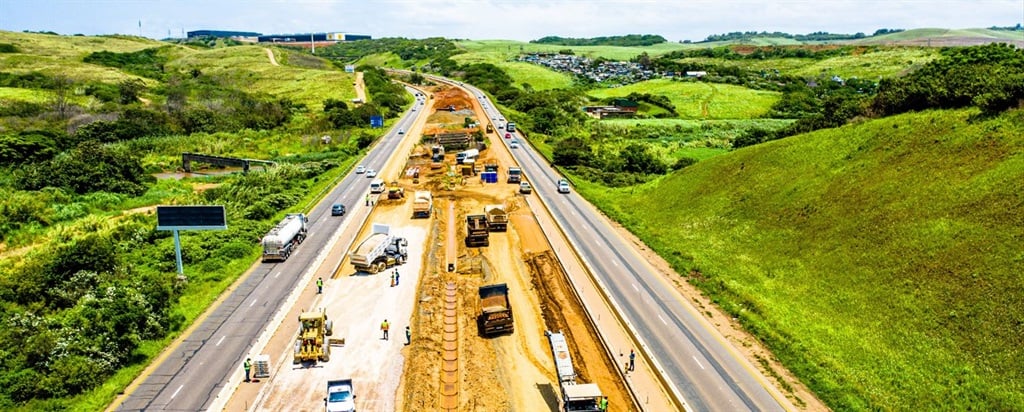
Sanral will and should be subjected to the highest levels of scrutiny, writes Vusi Mona.
The South African National Roads Agency SOC Limited (Sanral) has in recent months made headlines which may lead members of the public to wonder whether our national roads agency is drifting off course. On behalf of Sanral, I want to assure your readers that the board, management and our staff are all working tirelessly to ensure that we build and maintain world-class infrastructure.
“Roads are the arteries through which the economy pulses. By linking producers to markets, workers to jobs, students to school, and the sick to hospitals, roads are vital to any development agenda.” This quote from a 2015 paper on transport policies and development, authored by World Bank researcher Claudia Berg, aptly summarises what Sanral is about.
The work we do at Sanral is critical for South Africa’s economy and our country’s people. In turn, we take very seriously the responsibilities that come with managing the 23 559km of the national road network in our portfolio.
For context, Sanral roads make up only 4% of the country’s total road network, but that small portion carries 40% of all annual vehicle traffic, 60% of all freight in the country, and 70% of all road freight.
READ | ArcelorMittal shuts plants after govt infrastructure spending never came
Taxpayers need look no further than the recent repairs to the N2 at Bot River outside Cape Town, which drew praise from local people and politicians alike after Sanral repaired a flood-damaged bridge in five weeks. The Head of the National School of Governance, Professor Busani Ngcaweni, said the record-time repairs had caught his attention and will be used as a case study in some of their lectures.
Further up the coast, the new 410km N2 Wild Coast Road is taking shape, featuring two state-of-the-art mega-bridges. Also on the Indian Ocean coastline is the massive N2-N3 construction site which will vastly improve the flow of goods on the economic corridor from the port of Durban to Africa’s economic capital, Johannesburg, and beyond.
In the 2022/23 financial year alone, Sanral awarded tenders valued at R51 billion for the construction and maintenance of road infrastructure.
These numbers tell us that Sanral, modestly speaking, is an important state-owned entity. It follows, then, that Sanral will and should be subjected to the highest levels of scrutiny. As custodians of public funds, entrusted to us by the Department of Transport on behalf of the government and taxpayers, we welcome such scrutiny. Sanral is obliged by law to account for its expenditure and activities. However, criticism directed at us often lacks enough context to tell the full story.
Recent media reports have insinuated incompetence and even impropriety at Sanral; yet, neither accusation has been presented with any evidence. Our board of directors and the executive management have had to deal with extremely difficult operating conditions.
Sanral has also been accused of underperforming and missing its targets for several years. Some writers and commentators seem to have forgotten that Covid-19 and successive waves of the pandemic wreaked havoc on economies around the world throughout 2020, 2021 and well into 2022. The disruptive nature of the coronavirus on the management of Sanral’s operations was but one factor.
It is also common knowledge that there was an 18-month delay in the rollout of our projects due to a protracted impasse between Sanral and National Treasury on the 30% subcontracting clause. Whenever the “missed targets” story is written, this context is not provided.
READ | Sanral spends only half of roads budget, but sends 29 officials on trip to Prague
Cautious approach
Apart from the impact of Covid-19 and the delay in the implementation of numerous projects due to the impasse with the National Treasury regarding the definition of “local”, the February 2022 ruling of the Constitutional Court which effectively nullified the public sector’s preferential procurement rules led to the suspension of all tender advertisements. Sanral could only resume tender advertisements in August 2022, causing a delay of 174 tenders.
Another contributing factor was the catastrophic floods in KwaZulu-Natal, Mpumalanga, the Eastern Cape and Western Cape. These had a devastating impact not only on people’s lives, but also caused massive infrastructure damage. During that time, it was not business as usual for Sanral, as we had to lead the repairs to damaged road infrastructure, shifting resources for evaluations which took two months to complete. Resources from other regions had to be redirected towards that effort. These events were not foreseen.
That kept us busy for an entire year and some bridges have only recently been reopened. We know we have often been praised for the efficiency and speed with which we execute our projects, the Bot River Bridge being the most recent case in point, but to expect all these factors not to have impacted on Sanral’s capacity to execute on its projects is either naive or grossly over-estimating the roads agency’s ability.
Another factor was that Sanral adopted a more cautious approach towards project commencement involving a time-consuming process to consult local communities and ensure that projects are supported by people on the ground. The new policy saw service providers for Community Development Projects appointed directly instead as subcontractors under the main contractor. This not only advanced Sanral’s transformation agenda, but it also addressed the criticism that service providers were treated poorly by the main contractors.
READ | Carol Paton | Only Ramaphosa can end the feast for the politically connected
A number of planned reseal project awards were delayed or cancelled because of the introduction of the requirement that construction tenders must be evaluated by an independent engineering consultant. In addition, all projects now have to go through a three-month mobilisation period during which the main contractor is introduced to local stakeholders and the subcontracting packages finalised. To some, this may be regarded as a waste of time. To Sanral, which has come to appreciate stakeholder engagement and social facilitation with local communities, this gives us the licence to operate.
It is also important to mention that Sanral did not feature in a single hearing of the Judicial Commission of Inquiry into State Capture. In other words, no allegations were made at the Zondo Commission implying that any person at or associated with Sanral colluded to steal taxpayers’ money during that difficult time in our country’s recent history.
As recently as a few days ago and in spite of the spirited attempts by OUTA to suggest that Sanral may be involved in some nefarious activities with one of its concessionaires, OUTA’s case was dismissed with costs. Where then is this corruption of which Sanral is sometimes accused? Only in the province of the minds of some, we would suggest.
Notwithstanding a demonstrable record of good governance (which could easily lead to complacency), the board of Sanral was so concerned about the potential for conflict of interest, which could lead to corruption, that it resolved at a January 2020 board meeting that it should act to ensure that any such possibility was eliminated. This, after all, was one of the reasons for its existence: to ensure good governance and prevent corruption.
At issue was the fact that the construction contractor bid evaluation process had a major, and potentially corruptive, flaw. The process allowed the same service provider to do design drawings for an infrastructure project, develop the technical specifications for the tender for that project and determine the technical bid to be recommended for award by the Bid Evaluation Committee if it met other criteria.
With this in mind, the Sanal board therefore adopted a resolution on 28 January 2020 that the consultants involved in the design and the development of technical specifications should not be involved in the evaluation of technical submissions by bidders. The rationale for the resolution was to ensure that there was a separation and segregation of duties. This resolution applied to all tenders, and not only the bigger ones.
History
It boggles the mind, then, that the Sanral board is now being accused publicly for taking steps aimed at eliminating the possibility of corruption. The fact that the board resolution was not implemented by management led to major complications in the 2022/23 financial year, when five major tenders worth some R17 billion were cancelled by the board because they did not comply with the board resolution.
This, in turn, was a significant factor in Sanral’s irregular expenditure increasing by 1 741% in 2022/23 from the previous year. Understanding that this was largely as a result of efforts to close down avenues for corruption, the surge in irregular expenditure is obviously undesirable but clearly was unavoidable under the circumstances.
It is history that National Treasury conducted an investigation into the matter of the five cancelled tenders and basically agreed with the Board’s position. It is also history that the Auditor-General has since found that the non-compliance with the board resolution led to an irregular expenditure. But those who are hellbent on characterising the board as incompetent conveniently forget these facts.
The narrative that something is amiss at Sanral could not be further from the truth. Very soon, we will be doing a reflection of what Sanral has achieved as the current administration’s tenure comes to an end. In spite of the challenges we have had, the numbers look good. And figures don’t lie.
Vusi Mona is general manager of communications and marketing at Sanral.
News24 encourages freedom of speech and the expression of diverse views. The views of columnists published on News24 are therefore their own and do not necessarily represent the views of News24.






Recent Comments